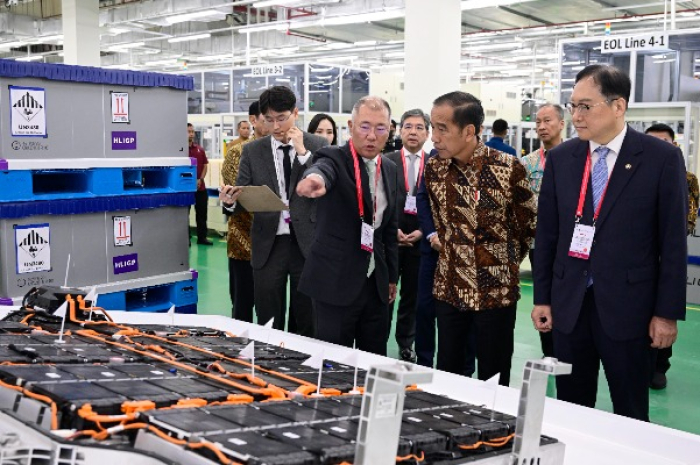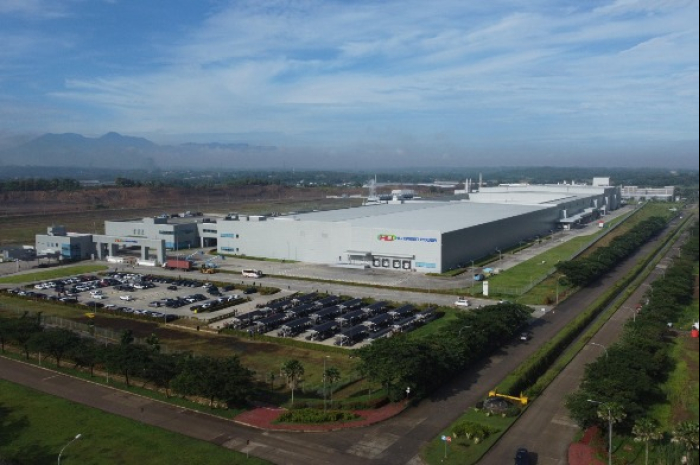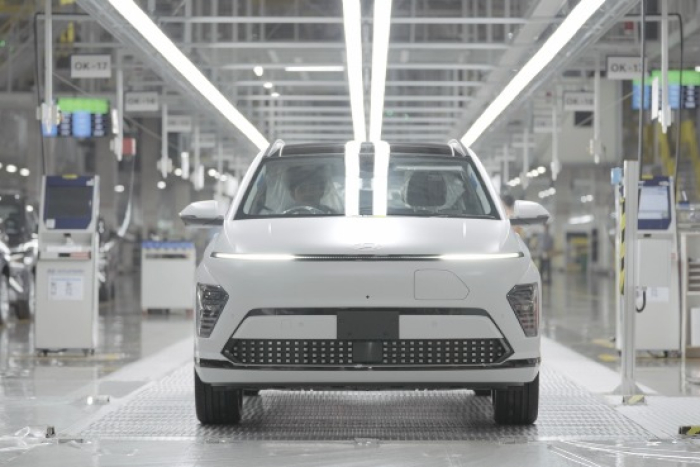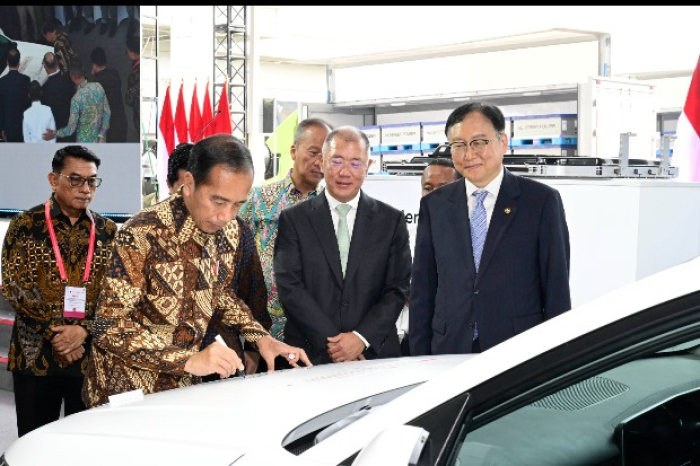Hyundai Motor completes EV ecosystem in Indonesia
The Hyundai Motor-LG Energy Solution battery JV in Indonesia has begun mass production of EV batteries
By Jul 03, 2024 (Gmt+09:00)
When in S. Korea, it’s a ritual: Foreigners make stops at CU, GS25, 7-Eleven


Maybe Happy Ending: A robot love story that rewrote Broadway playbook


NPS yet to schedule external manager selection; PE firms’ fundraising woes deepen


Samsung steps up AR race with advanced microdisplay for smart glasses


Seoul appeal: Korean art captivates Indonesia’s affluent connoisseurs



JAKARTA, Indonesia – Hyundai Motor Group has built an electric vehicle hub backed by a complete supply chain from raw materials sourcing to battery and EV manufacturing in Indonesia, the world’s largest nickel producer and fourth-most-populous country with about 280 million people.
Hyundai LG Indonesia Green Power (HLI Green Power), Hyundai Motor Co.'s battery joint venture with LG Energy Solution Ltd., began commercial production of batteries for Hyundai Motor’s all-new Kona Electric on Wednesday.
With the start of battery production at the plant, located in Karawang New Industry City, near Jakarta, the South Korean auto behemoth has completed its first-ever EV ecosystem, also the first of its kind in the Southeast Asian country aiming to decarbonize by 2060.
“Hyundai Motor Group and Indonesia together have made it possible to complete the battery cell plant and mass-produce the Kona Electric in Indonesia,” Hyundai Motor Group Executive Chair Chung Euisun said at the battery JV plant’s inauguration ceremony in Jakarta on Wednesday.
“This underscores our solid partnership and signifies that we are shaping the future of the EV ecosystem not only in Asia but also across the world.”

Hailing the completion of the country’s first EV supply chain, Indonesian President Joko Widodo, who also attended the ceremony, said, “We have entered a new era that will lead our country to become a global player. We are now competitive with a system covering the full cycle of EV production.”
INDONESIA’S FIRST COMPLETE EV SUPPLY CHAIN
With the opening of HLI Green Power, Hyundai Motor has become the first automaker in Indonesia to establish a local EV supply chain from battery cells to finished vehicles.
The $1.1 billion battery plant, held 50-50 by Hyundai Motor and LG Energy Solution, broke ground on a 320,000-square-meter site in September 2021 as Hyundai hoped to secure a stable supply of battery cells for its electric cars targeting the ASEAN market.
After production tests, it has begun commercial production this year, with an annual capacity of 10 gigawatt hours (GWh) of battery cells, enough to power over 150,000 EVs.
The factory produces NCMA (nickel, cobalt, manganese and aluminum) lithium-ion battery cells, which are chemically more stable and richer in energy density than NCM battery cells.

The batteries produced by HLI Green Power will be supplied to power EVs produced from Hyundai Motor’s car manufacturing plant in Indonesia, PT Hyundai Motor Manufacturing Indonesia (HMMI) located in Cikarang, West Java.
Built on a 777,000-square-meter land, the Korean auto giant’s first car plant with full production lines in the ASEAN region was completed in March 2022, producing five models, including two EVs such as the IONIQ 5 crossover and the all-new Kona Electric.
Currently, each Kona Electric is powered by 216 battery cells produced and packed at HLI Green Power.
Hyundai Motor also plans to supply HLI Green Power batteries to other EVs produced in Korea, including Hyundai's Casper and Kia Corp.'s EV3, as well as those in India and Indonesia, Jang Jae-hoon, Hyundai Motor president and chief executive officer, told reporters after the ceremony. “We are seeking to make the best use of the batteries.”
With a complete EV ecosystem built in Indonesia, covering raw material sourcing, battery and EV production, charging infrastructure construction and waste battery recycling, Hyundai Motor Group will up the ante to win the EV race in the ASEAN market with a population of 670 million.
WHY INDONESIA?
Indonesia has ample mineral resources such as nickel and cobalt – key raw materials for EV battery production. It is the world’s top nickel producer with the largest reserves.

But it is also the world’s fourth-most-populous country, of which 70% are working-age population aged 15 to 64. It is the No. 1 economy among ASEAN member nations.
With a big, relatively young population, the Southeast Asian country is quick to embrace new trends and technologies, raising expectations that the demand for electrified cars will grow rapidly in the country. Korean pop culture is also popular in Indonesia.
The Indonesian government is actively promoting EV production in the country as part of its carbon-neutral goal by 2060, boding well for Hyundai Motor’s EV ambition in the ASEAN region.
Under the goal, the Southeast Asian country hopes to produce 600,000 EVs by 2030 and to become one of the world’s top five EV battery producers by 2040.
EVs sold 18,000 units in Indonesia last year, accounting for a mere 2% of the global auto market, but the country’s EV sales are expected to jump to make up a double-digit share.
The Indonesian government has spent lavishly to expand the country’s nickel smelting and refining industry after banning the country’s nickel ore exports.
The Indonesian government also doles out handsome tax incentives for global automakers to expand the country’s EV penetration rate; it plans to swap out 130,000 combustion engine cars for EVs by 2030.
Write to Jung-Eun Shin at newyearis@hankyung.com
Sookyung Seo edited this article.
-
 AutomobilesHyundai accelerates EV push in Indonesia with Kona EV
AutomobilesHyundai accelerates EV push in Indonesia with Kona EVJul 02, 2024 (Gmt+09:00)
3 Min read -

-
 Electric vehiclesHyundai-LG battery JV in Indonesia to power IONIQ 5, other EVs: Chung
Electric vehiclesHyundai-LG battery JV in Indonesia to power IONIQ 5, other EVs: ChungSep 08, 2023 (Gmt+09:00)
4 Min read -
 AutomobilesHyundai leads Indonesia’s EV push with locally produced IONIQ 5
AutomobilesHyundai leads Indonesia’s EV push with locally produced IONIQ 5Sep 05, 2023 (Gmt+09:00)
4 Min read -
 BatteriesHyundai, LG Energy break ground on $1.1 bn Indonesia battery plant
BatteriesHyundai, LG Energy break ground on $1.1 bn Indonesia battery plantSep 15, 2021 (Gmt+09:00)
2 Min read


